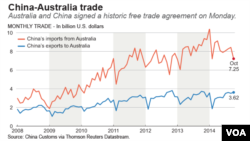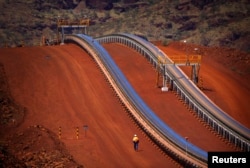China's growth rate has slipped to its lowest level in 25 years and there are growing concerns in countries that have relied on its booming economy. Analysts fear that Australia, which has prospered from exports of natural resources to China, could follow other resource-dependent economies into recession.
Since the global financial crisis, the world has largely been reliant on China for economic growth. But falling Chinese demand has led to a sharp fall in the price of commodities, including iron ore and coal, which have sustained the Australian economy.
Andrew Charlton, the head of consultancy firm AlphaBeta, said a slowdown in China is bad news for Australia.
“China accounts for nearly 50 percent of all globally-traded commodity demand and that means that if you're a commodity exporter, you are in line for a recession. Canada is in recession. Brazil is in one of the worst recessions in its modern history and you would have to think that Australia is in that same firing line,” said Charlton.
Australia has ambitions to overtake Qatar as the world’s biggest producer of liquefied natural gas, or LNG, and has invested heavily in export infrastructure. Markets in China, India and Japan have been targeted for exports, but prices for LNG have collapsed.
Tim Buckley, director of Energy Finance Studies Australasia, a research body, described recent investments in LNG facilities.
“LNG prices into Asia are down 60 percent. So Australia, in Queensland has just invested A$60-$70 billion (about US$42-50 billion) of capital investment to build the world's largest LNG export facilities, and literally as we're just turning them on as a country, the price of that product has just collapsed 60 percent,” said Buckley.
Tourism, another one of Australia’s key sectors, is also nervous about the economic uncertainty in China.
Last year, one million Chinese visitors came to Australia, a 22 percent increase from 2014.
But Anna Cook, who runs tours in Melbourne, is anxious about the future.
“I do worry. I think this time next year will tell, but there's no sign of it just yet. And you'd never know whether the statistics you are reading, whether they are true or whether it's perhaps panic-driven,” said Cook.
Despite the slowdown, Tim Harcourt, an economist at the University of New South Wales Business School believes that China will continue to underpin Australia’s future prosperity.
A decade-long resources boom may be fading, he said, but other sectors of the Australian economy are cashing in on demand from China.
“Australia has sort of moved from the mining boom to the dining boom because we have seen a boom in agricultural exports, and in some ways we have been helping to build the ‘great mall of China.’ A lot of our services and construction exporters have been helping to build the second and third-tier cities in western China. I think that is part of the next wave of engagement with China from Australia,” said Harcourt.
Harcourt believes the recently-signed Trans-Pacific Partnership, or TPP, will likely help Australian exports, but not at the expense of trade with China.
Australia is one of a dozen countries that are part of the TPP, while China is not.
“I think strategically Japan and the U.S. wanted to show that they were important leaders in the region, and I think that is part of the TPP story but for the most part I think what the TPP will probably do is eliminate some of the agricultural tariffs and protection that we have seen in Japan and Southeast Asia for a long time and that could of benefit to Australia, but it is unlikely to divert much trade away from China,” said Harcourt.
China is Australia’s biggest trading partner. Last year, commercial ties between the two counties were strengthened when a historic free trade agreement was signed.






